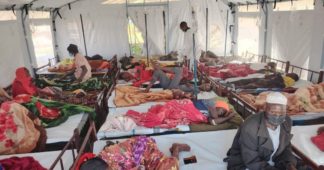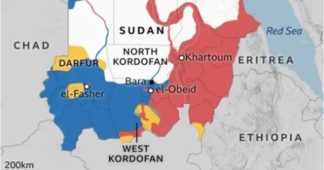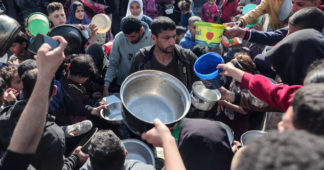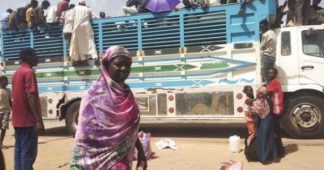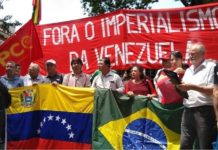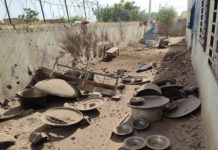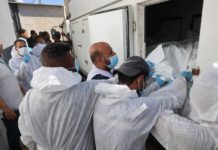After running out of animal fodder, people are now consuming cow skin as a last resort against starvation in North Darfur state’s besieged capital, cut off from all food supply by a 57-km wall the paramilitary has built around the city.
by Pavan Kulkarni
October 17, 2025
Walled in by war-torn Sudan’s paramilitary, the Rapid Support Forces (RSF), over two hundred thousand civilians in North Darfur state’s besieged capital El Fasher “have nothing left but resistance and a collective death,” warned the city’s Resistance Committees (RC)*.
Traders report having completely run out of food supplies as famine closes in on the malnourished population, cut off from food aid since the RSF laid siege on the city in April 2024 to oust the Sudanese Armed Forces (SAF) from its last foothold in the Darfur region.
There were “only some secret points to enter and exit the city”, through which small quantities of food supplies were being smuggled through the siege, reportedly with the collaboration of some RSF troops, said Saleh Osman, President of the Darfur Bar Association.
However, severe shortages and hoarding meant that grains were sold at prices multiple times higher than before the war started in April 2023. Unable to afford, most people were surviving on small portions of porridge made from kora ambaz – a type of animal fodder left behind after extracting oil from peanuts.
Unsafe for long-term human consumption, it had nevertheless become a staple of last resort for the survival of El Fasher’s residents. Now, however, the “ambaz is gone too”, the RC said in a statement on October 14.
Total siege
The earthen wall that the RSF started building around the city this May to totalize its siege is reportedly complete, 57 km long, leaving little or no opening for food or any other essentials to be smuggled in.
“El Fasher is now effectively under siege from all directions,” Stéphane Dujarric, Spokesperson for the UN Secretary-General, said in a briefing on Wednesday, October 15. With the “earthen barriers around the city… preventing movement of both people and supplies”, the city’s markets, which have been repeatedly bombed by the RSF, “are largely empty”.
The little amount of grain left in the city is priced beyond reach. “A kilo of rice costs 450,000 Sudanese pounds” – over USD 748 – said Adam Rojal, spokesperson of the General Coordination of Darfur Displaced People and Refugees. Early this month, even the cost of a 50-kilo sack of ambaz had reached 2 million Sudanese pounds, over USD 3,300.
The last of the community kitchens, which Dujarric described as the “last line of support”, closed down on October 11. “People are now eating cow skin to survive”, the RC said, posting a video of a resident roasting the animal hide over an open fire. “This is not just hunger. It’s a slow, deliberate death under the RSF siege.”
Famine – which first broke out in August 2024 in displaced people’s camps on the outskirts of El Fasher – is fast closing in on the city where about 260,000 residents, including 130,000 children, remain trapped, awaiting death by starvation, if they are not killed by the RSF first.
The smell of death now fills the streets
Composed of the Janjaweed militias organized by the SAF to commit mass atrocities during the civil war in Darfur in the 2000s, the RSF has ethnically cleansed several areas in the other four states of Darfur that it has taken over.
In over 250 attacks on El Fasher, the RSF has already killed hundreds in shelling. “The shells pour down like rain, not distinguishing between a sleeping child or a mother pleading to the heavens to protect her children,” the RC said after the intense bombardment of the city on October 3.
“The smell of death now fills the streets, blood washes over the pavements, homes are destroyed on top of their inhabitants, markets have been reduced to ashes, and bodies are being pulled from beneath the rubble – without names, without faces, only numbers in a long record of massacres.” Hundreds of bodies remain in the rubble of residential neighborhoods struck by drones.
Chemical weapons used?
The following day, on October 4, RSF drones dropped projectiles emitting a “strange and strong” smelling gas, after inhaling which several were rushed to hospitals, vomiting, convulsing, and hallucinating. “All signs point to the use of internationally banned gases or chemical agents,” the RC said.
Later on the night of October 7, RSF shelled the hospital multiple times, killing at least 13 and wounding sixteen others, including medics. The shelling destroyed several wards in one of the last remaining hospitals in El Fasher.
“No aid planes, no humanitarian bridge, no genuine international action”
“After over 500 days of unremitting siege by the RSF and incessant fighting, El Fasher is on the precipice of an even greater catastrophe if urgent measures are not taken to loosen the armed vice upon the city and to protect civilians,” UN High Commissioner for Human Rights Volker Türk warned earlier this month.
“The international community – led by the United Nations – continues to speak in the language of proposals without action. The UN proposal to deliver humanitarian aid by air to Al-Fasher has been awaited far too long, at a time when waiting is no longer an option – because people are dying of hunger now,” the RC complained.
“No aid planes, no humanitarian bridge, no genuine international action, no ground movement to lift the siege,” it lamented. “We cry for help and no one answers… We see our city being erased and we die resisting, because we have nothing left but resistance and a collective death in the silence of the world.”
*Organized in localities across Sudan’s cities, the Resistance Committees comprise a decentralized network of youth activists. It spearheaded the mass pro-democracy protests against the military junta before its components – the SAF and the RSF – turned on each other, hurling Sudan into a civil war in April 2023. Since the war, the Committees have been at the forefront of coordinating and organizing relief, rescue and defense of stranded civilians.
We remind our readers that publication of articles on our site does not mean that we agree with what is written. Our policy is to publish anything which we consider of interest, so as to assist our readers in forming their opinions. Sometimes we even publish articles with which we totally disagree, since we believe it is important for our readers to be informed on as wide a spectrum of views as possible.
